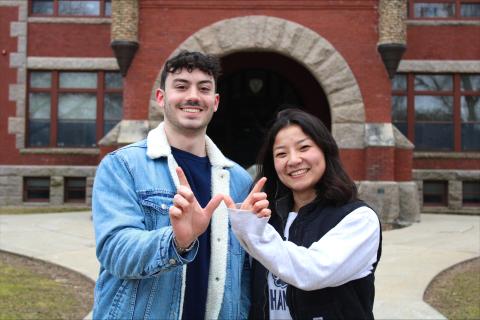Overview
The UNH Undergraduate General Election occurs each Spring semester to elect the Student Body President, Vice President and the Undergraduate University System of New Hampshire Student Board Representative. Additionally, a series of non-binding referendum questions are posed to students to allow for the collection of public opinion to inform important policy decisions.
Voting Period
Voting method: Microsoft Forms
The form will only be open during the voting period, 12:00AM - 11:59PM on March 28th, 2024.
All votes are verified using UNH user account data. Non-UNH undergraduate student votes will be removed. One vote per undergraduate.
58.6% Katumba and Rowley
40.6% Butcher and Lopresti
0.8% Other
98.1% Condon
1.9% Other
Voter Breakdown:
40.4% No
40.2% Yes
19.4% Abstain
46% No
42.9% Yes
11.1% Abstain
82.7% Yes
10.5% No
6.7% Abstain
35.5% Option 2: I would be in favor of the extension of Thanksgiving Break to become Monday-Friday, in which the Fall Semester would start a couple days to a week earlier in August.
32.3% Option 3: I would not be in favor of the extension of Thanksgiving Break, and I like the current Wednesday to Friday model, as well as the other long weekends during the fall semester.
21.8% Option 1: I would be in favor of the extension of Thanksgiving Break to become Monday-Friday, in which the Faculty Senate would remove Reading Days and other fall break days (ex. Mid-Semester Break) from the academic calendar.
10.3% Option 4: I would like to abstain from this question, or I do not care about this initiative.
Additional information for each candidate can be found below this section.
Student Body President/Vice President Tickets
Ticket 1: Lily Butcher (President) and Josh Lopresti (Vice President)

Lily Butcher - Student Body President candidate from Hopkinton, New Hampshire; Junior, Major
in Biomedical Science: Veterinary and Medical Sciences
Josh Lopresti - Student Body Vice President candidate from Melrose, Massachusetts; First-year,
Major in Political Science
Lily Butcher and Josh Lopresti are campaigning with the mission to ensure 3 core values: Authenticity, Unity, and Tenacity. As Student Body President and Vice President, Lily and Josh will function with complete authenticity. Communication between students and representatives is extremely important for effective representation, so Lily and Josh plan to create a newsletter allowing direct communication with students.
As transfer students, Lily and Josh understand the necessity for building community and a strong sense of belonging for students. Whether a commuter, transfer, or on-campus student, connecting to the University through student organizations, Fraternity and Sorority Life, or athletics will improve your life as a Wildcat. Of course, belonging is not possible without unity through collaboration, which will be encouraged through the Undergraduate Student Senate.
Communication and cooperation with senators will help to create a strong, stable team of uplifting leaders who can support relationships between student organizations. With a budget reset and new leadership arriving, the University’s transitions may be
challenging, but Lily and Josh see them as opportunities for innovation. Therefore, they will operate with tenacity, helping all members of the UNH community persevere during challenging and unpredictable times. Lily Butcher and Josh Lopresti will serve each member of the UNH community with dedication and pride.
WINNERS: Ticket 2: Christian Katumba (President) & Rachel Rowley (Vice President)

Christian Katumba
Year: Junior
Hometown: Kinshasa, Democratic Republic of Congo
Major: Economics and Ecogastronomy with a minor in international affairs
Rachel Rowley
Year: Sophomore
Hometown: Singapore, Singapore
Major: Philosophy
A concern that comes up often is the disconnect between the Student Senate and the student body. To help resolve this issue and to provide clarity to the student body, we plan to expand our outreach methods to engage with our constituencies, and to make aware to them that we are available to advocate for their needs. To put these aspirations into action, we would like to work with IT to develop an online system to receive comments, concerns, and questions to make communication more accessible on a single platform. In addition to that, we would like to find new ways to disseminate resolutions or work with the DPR to make the website updated and easier to navigate. Lastly, we would aim to post progress reports if possible to keep the student body as informed as we can. We find that the current Student Body Presidents have made a huge impact on the collaboration between student organizations. We would like to continue to foster that environment by uplifting and promoting the different student organizations that we have on campus. We believe that there is a place for everyone at UNH, and it is part of our responsibility to help students find their home away from home. To do this, we would like to continue engagement on social media with the different student orgs, so that not only can the student body find out about the events that are happening on campus, but also encourage student orgs to be aware of each other and create a strong community. In addition, we would like to create a master calendar to promote all the events being put on by students, to create a concrete platform to make students aware of all the efforts and opportunities being put in by other student leaders. We hope that this will uplift the many orgs at UNH to participate in each other’s events and strengthen the Wildcat community.
USNH Student Board Representative
Ticket: Mary (MJ) Condon

MJ Condon ‘25
Hometown: Chagrin Falls, OH
Major: Analytical Economics and Statistics
About Me: I am running for the University System Board of Trustees Representative to improve transparency of the university financial affairs along with representing the student body to the board. I plan to clarify historical financial management, including but not limited to navigation of declining undergraduate enrollment system wide, along with mandatory fee processes. As the University navigates restructuring following Budget cuts, efficient allocation of resources is imperative, I hope to advocate for cross campus collaboration, effective sharing of campus resources to minimize inefficient duplication of efforts, and embracing system wide academic collaboration. I also intend to increase transparency to students regarding the mandatory fee process, working with fee based services in order to highlight where student fee money is going. As the University faces declining enrollment , fee based services will experience drastic budget impacts. I plan to work with these departments in order to voice student support for and highlight the importance of these services on campus. I hope to utilize my experience as Student Body Vice President, the lessons I have learned in this role, and my newfound understanding of the University structure to advocate for the needs and priorities of the UNH Durham Undergraduate student body.
Additional information for each question can be found below the next section.
Question 1: Should student leadership positions within Student Activity Fee Organizations be awarded cash honoraria for their volunteer work?
Every undergraduate pays a $96 Student Activity Fee (SAF) as part of their mandatory fees. This money goes towards student organizations on campus to help fund their events. There are 11 Student Activity Fee Organizations (SAFOs) that have a set annual budget along with other rights and privileges. More than 100 student leaders across the SAFOs are paid between $250-550 annually depending on their position. These honoraria payments cost a total of about $54,000 each year (5% of the total yearly SAF budget).
Pro: Honoraria payments are a "thank you" to the students who step up for SAFO leadership positions. These roles are not trivial to navigate and require a level of commitment, skill, and organization. Leaving a million dollars a year of students' money in the hands of other students should be enough to warrant a modest honoraria payment to thank them for their work. Additionally, honorarium provides some financial relief to student leaders who (because of the demands of their roles) are challenged to balance classes, org stuff, and a job.
Against: The $54,000 currently spent on paying student leaders in SAFOs could be more valuably spent directly on programming for organizations , not paying students. This would allow more student organizations to put on larger events. Only student leaders in the 11 SAFOs get paid for their work, leading to inequity for other, un-paid RSO leaders. This precedent makes it seem as though their work is less important or less difficult just because their organization does not have a standing budget. To ensure equity and provide the most benefit to all students, this money should go towards student organization events, not paying other students.
Question 2: Should electric scooters and similar electric mobility devices be prohibited from on-campus paths and walkways?
Pro: With an increase of electric mobility devices around campus and with students riding them on sidewalks, walkways, paths, and crosswalks the chances of accidents also increase, with several of these incidences already occurring. This can be easily avoided if these devices were prohibited from the same areas of campus where members of the UNH community were expected to walk. While this would force students to ride on the road, that is where bicycles and other vehicles that students use are forced to operate, and electric mobility devices should be put in the same category.
Against: Allowing electric scooters and other electric mobility devices on paths and walkways keeps students out of the streets and therefore out of the way of cars traveling around campus. Forcing electric scooters and other mobility devices into the road or bike lane could cause a larger volume of devices and vehicles in the road, potentially cluttering the bike lanes or causing issues for motorists on campus. Additionally, riding on the walkways and paths of campus shortens travel time for students. With the unpredictable and often cold winter weather in Durham, this shorter travel time is very beneficial to students traveling on campus.
Question 3: Should the Department of Housing opt to provide students with tuition-included laundry services as opposed to providing students with access to Xfinity (including HBO and Peacock)?
Pro: Removing the direct cost for laundry could help prevent students from spending larger sums of money on laundry each semester, especially those that do not live in close proximity to their home or another place where they can get laundry services at no cost. Laundry services with no direct cost to students would be more convenient as current methods of payment force students to transfer money to their Cat’s Cache, a process that can create barriers for students that do not have access to electronic forms of payment. Many students are not aware of the University’s access to Xfinity streaming services and therefore do not utilize them, while laundry is a task typically done on a regular basis.
Against: Xfinity streaming services provide students with a wide variety of on demand movies and TV shows as well as channel options in partnership with HBO Max and Peacock. This allows students to avoid costly fees for streaming services. Students may feel that access to Xfinity is of greater value because they do not spend a substantial amount of money paying for laundry services and would therefore opt to keep access to the streaming services currently offered by the University.
Question 4: Should Thanksgiving Break be extended to a full week (as opposed to the current Wednesday-Friday) in exchange for starting school earlier or reducing holidays and reading days to make up for the lost teaching/learning days?
The UNH Faculty Senate is responsible for creating and setting the academic calendar, which sets when University holidays occur. Currently, Thanksgiving Break spans from Wednesday to Friday. However, this model may make it hard for some out-of-state students to travel home and be with their families. In addition, some professors may also already cancel classes during this week, leading to an inequity amongst majors and those who take certain courses. The Faculty Senate is considering changing the holiday break timeline. If the Faculty Senate were to approve this change, they would need to take away other time off during the academic year to meet the minimum number of required class days.
Option 1: I would be in favor of the extension of Thanksgiving Break to become Monday-Friday, in which the Faculty Senate would remove Reading Days and other fall break days (ex. Mid-Semester Break) from the academic calendar.
Option 2: I would be in favor of the extension of Thanksgiving Break to become Monday-Friday, in which the Fall Semester would start a couple days to a week earlier in August.
Option 3: I would not be in favor of the extension of Thanksgiving Break, and I like the current Wednesday to Friday model, as well as the other long weekends during the fall semester.
Option 4: I would like to abstain from this question, or I do not care about this initiative.
